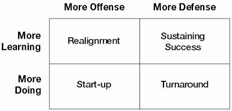Focusing Your Energy
Achieving clarity about the type of situation you are confronting helps you decide what you need to do in your first 90 days. In particular, clarity helps you to make three fundamental early choices:
-
How much emphasis will you place on learning as opposed to doing?
-
How much emphasis will you place on offense as opposed to defense?
-
What should you do to get some early wins?
Learning Versus Doing
How much time should you devote to deepening your understanding of your new organization as opposed to making decisions, initiating changes, recruiting new people, and so on? The correct balance of learning and doing differs strikingly in the four ST A RS situations. In turnarounds and start-ups, the premium is on doing. You have to make some early calls without full information. If you spend too much time learning, events will overtake you and create a vicious cycle. You will have to fire before you are certain of your aim and then adjust accordingly .
This is not to say that learning is unimportant in turnarounds and start-ups. But the learning required in these situations is fundamentally technical in nature. It is about mastering quickly what there is to know about the technical domain of the organization ”products, markets, projects, technologies, and strategies. This is the easiest and fastest type of learning.
In realignments and sustaining-success situations, a different emphasis on learning is warranted early on, because you are dealing with people who are, or think they are, successful. They may not be hungry for change or for direction from you. Early mistakes, especially if they are interpreted as risking the traditional strengths of the business, will cost you dearly. The good news is that you will have time to learn. There is no need for urgent early action in realignments or sustaining -success situations. You can afford to aim carefully before you fire your first critical shots.
In realignments and sustaining-success situations, you must delve deeply into organizational culture and politics. If, as was the case with Chris Bagley in the last chapter, you spend inadequate time understanding these dimensions of the organization, you will inevitably step on some land mines. As you have seen, learning about organizational politics and culture is hard work and takes time. Fortunately, you will have time if you give yourself permission to move cautiously and don t fall prey, as Claire Weeks did, to the action imperative.
Offense Versus Defense
Early on, how much time should you spend on offensive planning ”identifying new markets and developing new products and technologies ”and how much on playing good defense ”defending existing market share positions, buttressing existing positions , and extending existing products?
Of course, you need to do both in all of these situations. But the relative emphasis you should initially place on offense and defense differs greatly. For example, a start-up is all about offense: You are there to get something new going, and there is usually nothing to defend. In a turnaround , by contrast, the early imperative is good defense. You need to identify the remaining strengths of the organization and cut back to this defendable core that can help generate financial resources to support your next moves. Only then can you shift to offense and begin identifying and developing new platforms for growth.
Realignments and sustaining-success situations differ comparably. In a realignment , the agenda is to make midcourse corrections that take the business in new directions. You will still want to defend existing markets, but your best energies should be spent on the new offensive plan. In sustaining-success situations, the key is to play good defense early on, so you don t risk the crown jewels . Over time, you can gradually shift your attention to how you will take the organization to a new level.
Figure 3-2 depicts a matrix that summarizes where the early focus of energy should be in the four business situations.

Figure 3-2: Focusing Your Energy
Securing Early Wins
To build momentum in your new job, you have to get some early wins. But what a win is differs dramatically among the four situations. In a start-up, getting the right team in place and achieving strategic focus are key wins. Critically, you have to decide what you are not going to do ”and then you have to discipline your organization not to do it. In turnarounds, getting the right team in place is also a key potential early win, as is identifying the defendable core of the business and making major progress in paring the organization back to it. In realignments, gaining acceptance of the need for change and instilling a sense of urgency are often big early wins. Finally, in sustainingsuccess situations, gaining and displaying understanding of what has made the organization successful is a key early win, because it helps you win the right to make decisions about the organization s future.
EAN: 2147483647
Pages: 105